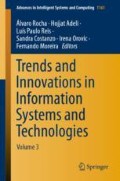Abstract
In order to contribute to the increasing inclusion of people who have been for a long time out of society, it is possible to construct accessible didactic material for specific audiences, such as for people with learning disabilities, or other barriers to the full achievement of their learning processes, for instance, elderly, deaf, and visually impaired people. This paper aims to contribute to the area of accessibility by presenting a set of recommendations for authors of Open Educational Resources that are not necessarily specialists in ICT, in order to help the process of providing more accessibility for people with learning disabilities.
Access this chapter
Tax calculation will be finalised at checkout
Purchases are for personal use only
References
Vygotsky, L.S., Luria, A.R., Leontiev, A.: Linguagem, desenvolvimento e aprendizagem [Language, Development and Learning]. Ícone, São Paulo (1991)
National Joint Committee on Learning Disabilities: Operationalizing the NJCLD definition of learning disabilities for ongoing assessment in schools. Learn. Disabil. Q. 21, 186–193 (1998)
Lagae, L.: Learning disabilities: definitions, epidemiology, diagnosis, and intervention strategies. Pediatr. Clin. North Am. 55(6), 1259–1268 (2008)
National Center for Education Statistics (NCES). https://nces.ed.gov/programs/coe/indicator_cgg.asp. Accessed 21 Nov 2019
Rose, D.: Universal design for learning. J. Spec. Educ. Technol. 15(3), 45–49 (2000)
Baldiris, N., Margarita, S., et al.: A technological infrastructure to create, publish and recommend accessible open educational resources. Revista Observatório 4(3), 239–282 (2018)
National Collaborating Centre for Mental Health UK: Challenging behaviour and learning disabilities: prevention and interventions for people with learning disabilities whose behaviour challenges (2015)
American Psychiatric Association: Diagnostic and statistical manual of mental disorders. BMC Med. 17, 133–137 (2013)
García, T., Rodríguez, C., et al.: Executive functioning in children and adolescents with attention deficit hyperactivity disorder and reading disabilities. Int. J. Psychol. Psychol. Ther. 13(2), 179–194 (2013)
Moreau, D., Waldie, K.E.: Developmental learning disorders: from generic interventions to individualized remediation. Front. Psychol. 6, 2053 (2016)
Davis, S., Laroche, S.: Mitogen-activated protein kinase/extracellular regulated kinase signalling and memory stabilization: a review. Genes, Brain Behav. 5, 61–72 (2006)
Samuels, I.S., Saitta, S.C., Landreth, G.E.: MAP’ing CNS development and cognition: an ERK some process. Neuron 61(2), 160–167 (2009)
González-Valenzuela, M.J., Soriano-Ferrer, M., Delgado-Ríos, M.: “How are reading disabilities operationalized in Spain”. A study of practicing school psychologists. J. Child. Dev. Disord. 2, 3 (2016)
Mace, R.L.: Universal design in housing. Assist. Technol. 10(1), 21–28 (1998)
Alnahdi, G.: Assistive technology in special education and the universal design for learning. Turk. Online J. Educ. Technol.-TOJET 13(2), 18–23 (2014)
W3C: Web content accessibility guidelines 1.0 (1999). https://www.w3.org/TR/WAI-WEBCONTENT/. Accessed 11 Oct 2019
Rocha, J.A.P., Duarte, A.B.S.: Diretrizes de acessibilidade web: um estudo comparativo entre as WCAG 2.0 e o e-MAG 3.0. Inclusão Soc. 5(2), 75–78 (2012)
W3C: Web content accessibility guidelines 2.0 (2008). https://www.w3.org/TR/WCAG20/. Accessed 11 Oct 2019
W3C: Web content accessibility guidelines 2.1 (2018). https://www.w3.org/TR/WCAG21//. Accessed 11 Oct 2019
Hall, T.E., et al.: Addressing learning disabilities with UDL and technology: Strategic reader. Learn. Disabil. Q. 38(2), 72–83 (2015)
Kuzmanovic, J., Labrovic, A.J., Nikodijevic, A.: Designing e-learning environment based on student preferences: conjoint analysis approach. Int. J. Cognit. Res. Sci. Eng. Educ. (IJCRSEE) 7(3), 37–47 (2019)
Hollingshead, A.: Designing engaging online environments: universal design for learning principles. In: Cultivating Diverse Online Classrooms Through Effective Instructional Design, pp. 280–298. IGI Global (2018)
Martin, N., et al.: Implementing inclusive teaching and learning in UK higher education–Utilising Universal Design for Learning (UDL) as a route to excellence (2019)
Courtad, C.A.: Making your classroom smart: universal design for learning and technology. In: Smart Education and e-Learning, pp. 501–510. Springer, Singapore (2019)
McKeown, C., McKeown, J.: Accessibility in online courses: understanding the deaf learner. TechTrends 63, 506–513 (2019)
Menke, K., Beckmann, J., Weber, P.: Universal design for learning in augmented and virtual reality trainings. In: Universal Access Through Inclusive Instructional Design: International Perspectives on UDL, p. 294 (2019)
Armstrong, A.M., Franetovic, M.: UX and instructional design guidelines for m-learning. In: Society for Information Technology & Teacher Education International Conference. Association for the Advancement of Computing in Education (AACE) (2019)
Hockings, C., Brett, P., Terentjevs, M.: Making a difference—inclusive learning and teaching in higher education through open educational resources. Distance Educ. 33(2), 237–252 (2012)
Teixeira, A., et al.: Inclusive open educational practices: how the use and reuse of OER can support virtual higher education for all. Eur. J. Open Distance E-Learn. 16(2) (2013). https://www.eurodl.org/?p=special&sp=articles&inum=5&abstract=632&article=632
Navarrete, R., Luján-Mora, S.: Improving OER websites for learners with disabilities. In: Proceedings of the 13th Web for All Conference. ACM (2016)
Silveira, I.F.: OER and MOOC: the need for openness. Issues Inf. Sci. Inf. Technol. 13, 209–223 (2016)
King-Sears, M.: Universal design for learning: technology and pedagogy. Learn. Disabil. Q. 32(4), 199–201 (2009)
Raskind, M.H.: Assistive technology for adults with learning disabilities: a rationale for use. In: Gerger, P.J., Reiff, H.B. (eds.) Learning Disabilities: Persisting Problems and Evolving Issues, pp. 152–162. Andover Medical Publishers, Boston (1994)
Acknowledgment
This work was supported by the ERANET-LAC project which has received funding from the European Union’s Seventh Framework Programme. Project Smart Ecosystem for Learning and Inclusion – ERANet17/ICT-0076SELI. The work was also supported by the Coordenação de Aperfeiçoamento de Pessoal de nível superior - Brazil (CAPES) - Programa de Excelência - Proex 1133/2019 and Fundação de Amparo à Pesquisa do Estado de São Paulo (FAPESP) 2018/04085-4.
Author information
Authors and Affiliations
Corresponding author
Editor information
Editors and Affiliations
Rights and permissions
Copyright information
© 2020 The Editor(s) (if applicable) and The Author(s), under exclusive license to Springer Nature Switzerland AG
About this paper
Cite this paper
Martins, V.F., Amato, C., Tomczyk, Ł., Oyelere, S.S., Eliseo, M.A., Silveira, I.F. (2020). Accessibility Recommendations for Open Educational Resources for People with Learning Disabilities. In: Rocha, Á., Adeli, H., Reis, L., Costanzo, S., Orovic, I., Moreira, F. (eds) Trends and Innovations in Information Systems and Technologies. WorldCIST 2020. Advances in Intelligent Systems and Computing, vol 1161. Springer, Cham. https://doi.org/10.1007/978-3-030-45697-9_38
Download citation
DOI: https://doi.org/10.1007/978-3-030-45697-9_38
Published:
Publisher Name: Springer, Cham
Print ISBN: 978-3-030-45696-2
Online ISBN: 978-3-030-45697-9
eBook Packages: Intelligent Technologies and RoboticsIntelligent Technologies and Robotics (R0)

